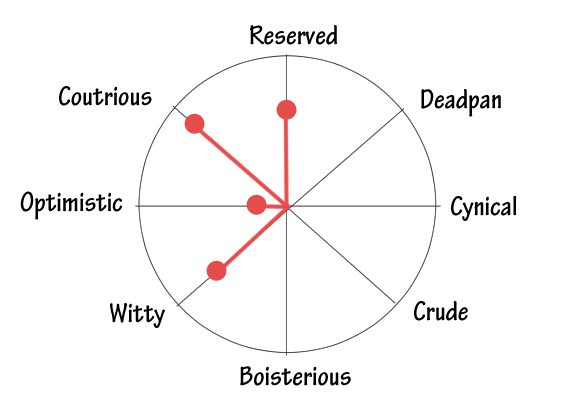I'm working on a little side project that has some life-sim elements akin to Harvest Moon or Stardew Valley. Mostly forming relationships with the various townsfolk and ultimately marrying and raising a family with one.
One of the things I am experimenting with is to give your player character some sort of personality based on your input. In turn, certain NPCs will find certain personality traits more or less appealing. This is an attempt to remedy the RPG cliche where you play as an emotionless mute that everyone somehow loves and admires.
So what I am thinking is that many occasions when you are interacting with an NPC, they will prompt you to give a response. At which point you will be given a choice of not so much what you say, but how you say it. The following chart will pop up giving you a choice of 8 personality traits to express.

Each choice may present a piece of dialogue to go with it, but I am not attempting to make an 8 headed dialogue tree for every interaction here. The dialogue would essentially say the same thing, but with a different personality. So if an NPC, for example, asked you if you liked her hat. You can say yes or no, but you can choose to be an optimist and say "yes, it looks excellent on you" or a cynic and say "yeah, I guess. If you're into that kind of thing". The character will give a quick reaction to clue you in to if they like or disapprove of that response, and the interaction continues.
You'll notice on the example chart there are red dots with connected lines. Each choice nudges you toward that personality and away from the opposite type. So, for example, choosing to give frequent reserved responses will make you less boisterous and more reserved. So the image above shows witty courteous person who is rather reserved and a bit of an optimist.
As for a game play example, the Inkeeper's daughter might like people who are witty and boisterous. Having a personality that covers those traits will cause her to form a friendship with you more quickly. Not to say that she will never like you if are reserved and deadpan, but if will take much longer to form a friendship.
That's all I have to say about that aspect. I just wanted to get people's input on the idea. Is it good, is it bad? Has it been done before or has a better system been done before? Is it horrifically broken? Let me know what you think.
One of the things I am experimenting with is to give your player character some sort of personality based on your input. In turn, certain NPCs will find certain personality traits more or less appealing. This is an attempt to remedy the RPG cliche where you play as an emotionless mute that everyone somehow loves and admires.
So what I am thinking is that many occasions when you are interacting with an NPC, they will prompt you to give a response. At which point you will be given a choice of not so much what you say, but how you say it. The following chart will pop up giving you a choice of 8 personality traits to express.

Each choice may present a piece of dialogue to go with it, but I am not attempting to make an 8 headed dialogue tree for every interaction here. The dialogue would essentially say the same thing, but with a different personality. So if an NPC, for example, asked you if you liked her hat. You can say yes or no, but you can choose to be an optimist and say "yes, it looks excellent on you" or a cynic and say "yeah, I guess. If you're into that kind of thing". The character will give a quick reaction to clue you in to if they like or disapprove of that response, and the interaction continues.
You'll notice on the example chart there are red dots with connected lines. Each choice nudges you toward that personality and away from the opposite type. So, for example, choosing to give frequent reserved responses will make you less boisterous and more reserved. So the image above shows witty courteous person who is rather reserved and a bit of an optimist.
As for a game play example, the Inkeeper's daughter might like people who are witty and boisterous. Having a personality that covers those traits will cause her to form a friendship with you more quickly. Not to say that she will never like you if are reserved and deadpan, but if will take much longer to form a friendship.
That's all I have to say about that aspect. I just wanted to get people's input on the idea. Is it good, is it bad? Has it been done before or has a better system been done before? Is it horrifically broken? Let me know what you think.
